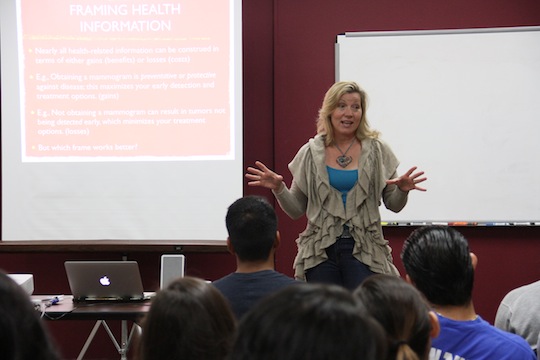
Dr. Lisa Sparks Brings Health Literacy & Inspiration to the NAC at Chapman Visiting Scholars Series
Nicholas Academic Centers’ students gathered on Saturday, May 11, for the last Chapman University Visiting Scholars Series lecture of the 2012-2013 school year, featuring Dr. Lisa Sparks’ presentation, “Community-Based Health Campaigns: Be An Innovator!”
Dr. Sparks opened the presentation by explaining how the study of Health Communication impacts patient and healthcare provider interactions. “Most of the approach that I take to studying healthcare interactions is looking at and unpacking what we call ‘culturally competent’ messages towards targeted populations.” These “targeted populations” cover a wide range of interactions across the communication continuum, from interpersonal interactions, such as one-on-one conversations between siblings or parents, to organizational interactions between students and their school contacts, from teachers to advisors and even administrators. Dr. Sparks notes, “Sometimes there’s miscommunication, or we don’t understand each other, and so we have to sort through and navigate the situation to get our needs met.” In a medical setting, competent communication between patients and their healthcare providers can mean the difference between life and death. Dr. Sparks comments, “Decision making in the health context can be really important, because if there’s a major miscommunication, or even a minor miscommunication of a prescription or a treatment, things can go wrong really quickly.”
On the other side of the communication continuum, media regularly affects healthcare decision making through “social modeling.” Dr. Sparks explains, “Think about all of the things you see on Youtube, on TV shows, or anything that’s sort of health-oriented. We learn about healthcare, and sometimes make decisions [based] on things we see on TV, or things we see on Youtube that may or may not be correct or credible, but we still make decisions because we’re exposed to those messages.” Students cited shows they’ve watched, including Criminal Minds that have influenced the way they perceive mental health conditions like drug addiction. As a scientific advisor to television shows like House and Grey’s Anatomy, Dr. Sparks has played a role in helping mainstream media “get it right.” She notes, however, that ratings drawn from dramatic, yet sometimes-inaccurate conditions and treatments often outweigh a show’s demand for accuracy.
During her presentation, Dr. Sparks presented a definition for health literacy and then analyzed its components. Dr. Sparks pointed to “health literacy” as crucial in effective patient and provider interactions. After providing examples to demonstrate various applications of health literacy, Dr. Sparks challenged NAC students to carefully read a number of slides to discover the similarities and differences between healthcare options given for a hypothetical scenario. In the scenario, a number of solutions were given to handle a fictional virus outbreak. In reality, many of the solutions were the same, but they appeared different because of how they were worded.
After learning about health literacy and the consequences of poor communication between healthcare providers and their patients, Cassandra Garibay expressed her view on self-advocacy. “You shouldn’t be scared to ask a question, even if it’s a ‘dumb’ question; no question is ever too dumb.” She continues, “If you know it’s going to be able to help you understand, it’s better to ask.” Dr. Sparks gave three simple but important questions for a patient to ask his or her provider: 1. What is my main problem/concern? 2. What do I need to do? 3. Why is it important for me to do this?
For the latter part of the presentation, students worked in small groups to create campaigns to bring attention to issues like teen drug use, healthy eating options at home and at school, and the effects – good and bad – of parental and peer influence. One of the groups chose to act out a skit in which two friends approached a third friend to offer her help in overcoming a growing drug addiction. On why her group addressed addiction intervention, NAC student Marisol Loza explains, “We did it because there are a lot of people that have addiction, and they don’t want anybody to help them; there are some people that are willing to help them, but they just need to find the right person.” Throughout the skit, students carefully worded their plea to help their friend get counseling for drug use, focusing on the “we” aspect of getting help, as in “We can talk to somebody about this,” as opposed to saying, “You need to go to rehab.” Dr. Sparks stressed that small details like these can make a big difference, especially when the message is meant to be persuasive.
Click HERE to watch a video on our Youtube channel.
